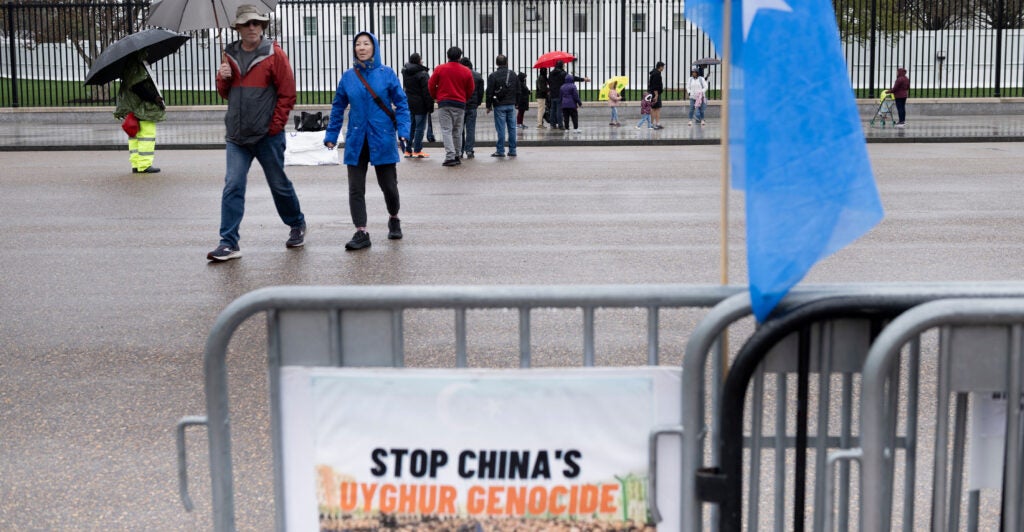British parliamentarian William Wilberforce’s legacy rests on his bold public stance against slavery. The legendary 18th- and 19th-century abolitionist stood up before the British people in the House of Commons with a message of piercing moral clarity: Whatever the cost of abolition, there is no excuse for slavery.
After several years of impassioned advocacy, Wilberforce declared to the House of Commons, “Having heard all of this, you may choose to look the other way, but you can never again say you did not know.”
Given the findings of the U.S., the United Nations, and the European Union, the world can no longer deny knowledge of the Chinese Communist Party’s crimes against humanity, including forced labor, perpetrated primarily against the Uyghurs.
With ignorance no excuse, it’s time for Europe to follow the U.S. example, remove the products of Uyghur forced labor from its store shelves, and stop permitting the CCP to profit from genocide.
In December 2021, with irrefutable evidence of genocide and forced labor throughout Xinjiang, the U.S. enacted the Uyghur Forced Labor Prevention Act to eliminate products of forced labor from American imports.
To ensure this, the forced-labor ban presumes all Xinjiang goods are the product of forced labor unless the importer proves otherwise through clear and convincing evidence. However, while the law has reduced forced-labor imports, enforcement must continue to be strengthened to completely eliminate this despicable trade.
Slow to follow suit, the European Commission proposed banning goods made with forced labor in October 2022. In an encouraging move, the European Parliament approved anti-forced labor regulations in April, but the European Council must ratify them to reduce this heinous trade.
While Britain can point to public corporate reporting on forced labor, thanks to the Modern Slavery Act of 2015, the British government has not passed legislation or established a legal precedent barring imports from Xinjiang.
Tragically, Europe’s hesitation has incurred a grave cost, as American officials regularly share details of the Chinese Communist Party’s ongoing repression of the Uyghur population. Not only has the CCP conducted mass sterilization and forced more than 1 million Uyghurs into political reeducation camps, its efforts include widespread forced labor—in other words, slavery—in sectors ranging from clothing to solar panels.
Enforcement statistics from U.S. Customs and Border Protection bear this out, with records detailing $670 million in denied shipments, out of total reviewed shipments of $3.7 billion, implicated in forced labor over the past two years.
Without a unified stand by U.S. allies, however, Xinjiang’s exports just end up rerouted. For example, Xinjiang’s exports to European Union countries increased by 34% in 2022, the year the Uyghur Forced Labor Prevention Act took effect in the United States.
At an April 2023 Congressional-Executive Commission on China hearing, Anasuya Syam, the human rights and trade policy director at the Human Trafficking Legal Center, warned lawmakers: “Without a similar, regional approach [to the Uyghur Forced Labor Prevention Act] to Xinjiang, the EU will continue to be a dumping ground for goods manufactured using Uyghur labor.”
Despite that evidence, however, Europe remains rhetorically bold, but slow to act.
European capitals have publicly hailed measures to reduce trade in goods created through forced labor. A European Parliament resolution called on the European Commission “to propose an import ban on all products produced by forced labour and on products produced by all Chinese companies listed as exploiting forced labour … .”
Belgian Deputy Prime Minister Pierre-Yves Dermagne has affirmed, “This hideous crime must be eradicated, and the first step to achieve this consists in breaking the business model of companies that exploit workers.” And in 2021, Britain’s then-trade secretary, Liz Truss, declared, “Forced labour, anywhere in the world, is unacceptable.” However, Europe has yet to match those lofty words with action.
Considering the CCP’s continuing abuse of Uyghurs as a slave-labor force, the European Council should ratify the Forced Labour Regulation adopted by the European Parliament to ban imported goods produced by forced labor at its next meeting in June and move forward with implementation.
Given America’s experience implementing trade restrictions to stamp out forced labor, from laws like the Tariff Act of 1930 as amended in 2015 to the Uyghur Forced Labor Prevention Act, the State Department should work with the United Kingdom and other European allies to strengthen measures denying market access to the products of forced labor.
By taking these actions, America and our European allies can stand with Wilberforce in recognizing that now is “a time [in] which all … should be strenuous in their endeavours to lighten the vessel of state, of such a load of guilt and infamy.”
